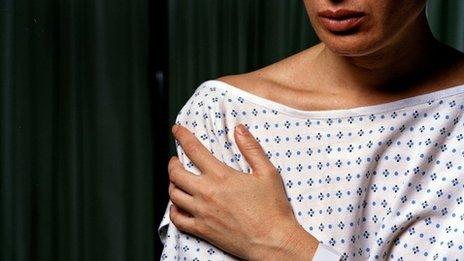What is the Francis effect?
- Published

Health Secretary Jeremy Hunt has called it the "Francis effect".
He believes the publication of the public inquiry into the Stafford Hospital scandal - led by Robert Francis QC - has been a catalyst for improving care.
But is this really true?
On one hand, most people agree it has refocused minds in an era when there is so much attention given to targets and balance sheets.
When the 1,800-page report was published on 6 February 2013 one phrase stood out.
The NHS system, it said, had "betrayed" the public and patients by putting corporate self-interest ahead of care.
That criticism sent shockwaves through the system.
Failing hospitals
Much of the past year has been spent with hospitals - and other providers for that matter - looking for ways to improve services, as Jocelyn Cornwell, of the Point of Care Foundation, explains.
"The Francis Inquiry has made a difference and inspired positive change. Senior managers have become more focussed on the quality of care and are listening more intently to feedback from both patients and staff about how services are delivered."
This, according to Mr Hunt, has resulted in something tangible: an increase in the number of nurses working on wards.
To prove this point, he has highlighted data from the Health and Social Care Information Centre - the official statistics body for the NHS - which shows the number of acute, elderly and general nurses (most of which work in hospitals) has risen by 3,500 in the past year to over 172,000 in October, the latest month for which figures are available.
But it is important these figures are seen in a wider context. If you look back over a longer time frame - say three years - overall nurse numbers (including the likes of midwives and health visitors) have hardly changed.
And, in fact, once you strip out those working in maternity care (increased to keep pace with the rising birth rate) the numbers have actually fallen.
This suggests the boost in hospital nurse numbers has come at a price: there has been a drain on other areas of the workforce.
Other key steps highlighted by Mr Hunt include the introduction of tougher inspections and a better regime for dealing with failing hospitals.
The Care Quality Commission launched its new way of inspecting hospitals in September.
This was widely welcomed as officials promised the visits would be longer and more expert-led - that is to say led by doctors and other staff who have experience of working in hospitals.
Although arguably these changes were set in train in 2012 following the appointment of a new leadership team at the CQC.
Happy staff
The point about failing hospitals relates to the 14 trusts placed in special measures, which has led to new management or extra support being put in place.
Again, there is praise for these steps.
Julie Bailey, of Cure the NHS, which helped bring the scandal of Stafford Hospital to national attention, called Mr Hunt "brave" for standing up for patients when she addressed the conference, Francis: A Year On, this week.
But it is also clear there have been some negative consequences, according to Sir Richard Thompson, president of the Royal College of Physicians.
He said the last year has seen a tendency to "beat up" the NHS, and hospitals in particular.
And this seems to have had an effect on morale.
In the latest quarterly report by the King's Fund think-tank staff morale was highlighted as the number one concern for finance directors above other factors such as finances and waiting times.
Sir Richard said it was now important to start "celebrating success" to improve wellbeing and morale.
His point is this: happy staff deliver good care.